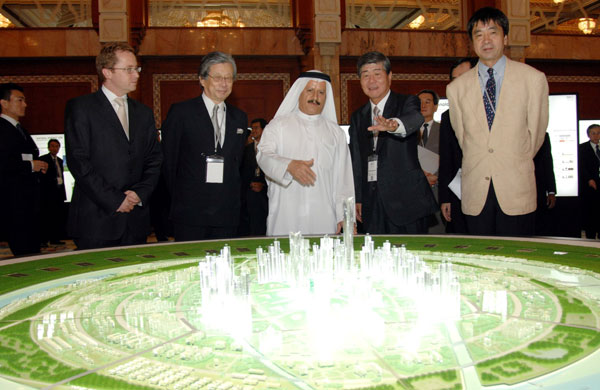UAE applauds latest environmental initiatives against escalating carbon footprint.
 Other News
Other News Subscribe to newsletter
Subscribe to newsletter
| 21 Nov 2007 |
The United Arab Emirates is driving initiatives to minimise the negative environmental impact of urban development, says HE Dr Muhammad Saeed Al Kindi, the federal Minister of Environment and Water.
Speaking at the unveiling of ‘Cool City’ at VIP presentations to high level government and business leaders in both Abu Dhabi and Dubai, the minister identified action areas as sustainable construction, the use of renewable energy, efficient waste management and the combating of air pollution.
The Cool City concept - using available green technology in transport, urban development and architecture with a low carbon footprint - is being promoted by the Sustainable Urban Development Consortium for Japan and Gulf States Partnership, orchestrated by Nikken Sekkei, one of the world’s largest architectural design firms.

HE Dr Muhammad Saeed Al Kindi, the UAE Minister of Environment and Water at a model of the Cool City.
Unveiled at symposiums on 4 and 5 of November, Cool City would consume up to 60 per cent less energy than a conventional urban area by using cutting-edge technologies already tried and tested in Japan.
“The UAE is one of the biggest oil producing countries in the world,” HE Yuriko Koike, a member of the Japanese House of Representatives and former Japanese minister of environment, told the symposiums. “It is important to the world that…efficient energy consumption also takes place in oil producing countries. Utilising Japanese technology in the UAE will be good for our two countries and at the same time it will be an excellent role model globally.”
This theme was taken up by Professor Kiyoshi Kurokawa, special advisor to the Cabinet of the Japanese Government, He singled out the Abu Dhabi Masdar Initiative – a global platform for the search for solutions for some of mankind’s most pressing issues such as energy security, climate change and sustainable development including renewable energy and environmentally friendly technologies.
The Masdar Initiative is part of the remit of the Abu Dhabi Future Energy Company and Professor Kurokawa expressed the hope that Japan could act as a partner in collaboration with the “truly daunting” Masdar Initiative.
Dr Al Kindi said that In order to cope with the fast pace of development in the UAE, a federal strategy had been introduced in which government institutions are urged to adopt practical solutions to achieve sustainable development.
He singled out the recent launch by HH Sheikh Mohammad bin Rashid Al Maktoum, Vice President and Prime Minister of the United Arab Emirates and Ruler of Dubai, of a green buildings initiative in which all civil and commercial buildings in Dubai will have to be designed and constructed to strict environmentally-friendly standards. “This decision makes Dubai the first city in the Middle East and one of the first in the world to implement and enforce green building codes of practice and regulations,” he added.
“As the Minister of Environment made clear, the UAE is well aware of the environmental challenges it faces and energy conservation will be a key issue in years to come,” said Mitsuo Nakamura, consortium representative and President and CEO of Nikken Sekkei, “We wanted to share our technological advances in the belief that they can make a significant contribution towards reducing the UAE’s carbon footprint.”
Japan is a pioneer in many areas of energy and environmental technology leading to consumption of primary energy per GDP being only half the average of OECD countries and more than 70 per cent less than the world average.
The symposiums featured a total of 11 world-class organisations including Nikken Sekkei, Sanyo, Toshiba, Hitachi, Panasonic and other influential Japanese companies. The symposiums were also supported by the Japanese Embassy in the UAE and Consulate General of Japan, along with the Japan Bank for International Co-operation, the Japan External Trade Organisation, Nikkei Inc., Heat Pump and Thermal Storage Technology Centre of Japan, Nippon Keidanren, Toyota Motor Corporation and the Abu Dhabi Future Energy Company Masdar.




